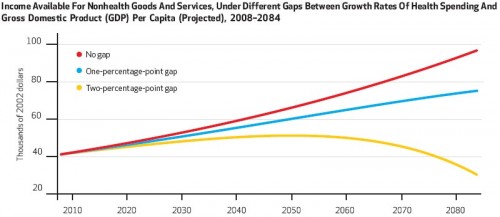Here’s an actual, not hypothetical, moral hazard story. This past year my family has used a lot more health care than in any prior year. I’m not talking about big ticket items. I’d estimate the total cost to our insurer is in four figures. We could have afforded to pay for the care entirely out of pocket, but we didn’t have to. Insurance picked up most of the tab.
Had we had to pay OOP, we’d have used a lot less of this care, maybe none of it. Nothing was urgent. Nothing was life threatening. None of it pertains to serious chronic illnesses. So is this an example of moral hazard? Yes it is, or arguably so.
Yet, the fact is, we’re far better off for the care, though not in typically measurable ways. None of it prevented hospitalization or ER visits. None of it decreased mortality. But much of it made us happier, more comfortable, better able to enjoy life, and work.
So, it’s care I’m glad I had, but not care I’d have been willing to pay for at full cost up front. Knowing its benefits after the fact, I might have paid more for it. If I could go back and talk to myself a year ago I’d say, “Get this care, even if it costs $5,000. Pay it. You’ll be happy.” But that’s not how it works. I have to decide not knowing the outcome. That it seems like my insurer pays for all but a tiny bit of it (and I do so with copays and indirectly and largely invisibly through payroll deducted premiums that are connected to aggregate use, not these specific services), removes the financial disincentive for care. Thus, I got more of it.
So, I’ve admitted to moral hazard. I’ve said I’d not have gotten some or all of this care if I had had to pay a lot more OOP. What if our doctors, not me, not my insurer, were at risk for the cost of that care (e.g., an ACO model)? Would we have received it? Maybe not as much.
Do I want our incentives to use this care expunged from our system, either because I or my doctors are at greater risk for its cost? Would I be happier getting less and costing the system less? That’s a very hard question. I have to reconcile the personal with the systemic.
Here’s what it comes down to: I like what I get today, but I don’t like the long-term consequences of the system that permits me (and all of us) to get what we get the way we get it and pay for it. The fundamental reason I support changes to health care use incentives so I’m more likely to get less is that I like other stuff too. I want our government and society to be able to do more than pay for health care. Put more simply, this graph frightens me (see prior post for details).

I don’t think we’ll let ourselves get into the situation that the yellow line illustrates. We like health care, but not at the complete expense of all other things. There will be a correction. The point of worrying about it is that it matters how the system is corrected. All policy has implications. None is ideal. Hence, the debate, and my job.
What to do about moral hazard? I don’t have a perfect answer. But something will be done.


